Enterprise AI initiatives are stalling. What starts as a promising pilot often collapses under the weight of implementation complexity and integration requirements. The challenge for enterprise organizations is finding automation platforms that deliver results without requiring massive operational overhead.
n8n offers a self-hosted automation platform built for technical teams, while Zapier provides enterprise AI orchestration across your organization. Both can power enterprise automation, but they serve different organizational needs and priorities.
As a Zapier employee, I’ve spent considerable time evaluating both platforms from an enterprise perspective, analyzing real-world implementations and total cost of ownership. Here’s how the Zapier vs. n8n comparison breaks down for enterprise organizations.
Table of contents:
Zapier vs. n8n at a glance
Zapier is a cloud-based AI orchestration platform designed for enterprise teams who want to scale automation across their entire organization quickly and safely. n8n is a self-hosted automation tool that appeals to technical teams prioritizing complete infrastructure control.
Here’s a quick summary, but keep reading for more details.
|
Enterprise impact |
Zapier |
n8n self-hosted |
|
|---|---|---|---|
|
Time to value |
Critical for ROI realization |
Minutes to deploy |
Days to weeks to set up |
|
Integration ecosystem |
Determines platform flexibility |
8,000+; pre-built |
400+; requires custom dev |
|
Total cost of ownership |
Impacts budget planning |
Predictable operating expenses |
Hidden infrastructure costs |
|
Enterprise security |
Critical for regulated industries |
SOC 2 Type II; GDPR; CCPA |
DIY compliance burden |
|
Team enablement |
Affects organizational scalability |
No-code for all users |
Developer-dependent |
|
AI integration |
Essential for AI transformation |
Native AI orchestration |
Manual AI configuration |
Zapier is focused on cloud innovation; n8n offers self-hosted control
The fundamental difference between Zapier and n8n isn’t just about features: it’s about how your organization approaches automation infrastructure.
Zapier operates as a fully managed AI orchestration platform designed for business agility. The philosophy is simple: your technical teams should focus on building your core business, not maintaining automation infrastructure.
Instead of your IT team being a backlog, they can provide governance while democratizing automation-building throughout your organization. With enterprise-grade security (e.g., SOC 2 Type II certification, GDPR compliance, CCPA compliance), you won’t have to worry about giving that freedom to individual builders. And the no-code interface empowers every department to build AI-powered workflows.
For enterprise organizations, this means immediate access to enterprise-grade automation without the operational overhead.
n8n, on the other hand, takes a developer-centric approach, giving organizations complete control over their automation infrastructure. This sounds appealing in theory, but the reality involves significant operational complexity.
The self-hosted model requires:
-
Infrastructure management: Server provisioning, scaling, monitoring, and maintenance
-
Security implementation: Custom compliance configuration and vulnerability management
-
Technical expertise: JavaScript/Python knowledge for workflow creation and platform maintenance
That’s where many enterprise evaluations get stuck. When IT leaders say “we need self-hosted,” they’re often expressing underlying concerns about control, security, or compliance. But most enterprises requesting “self-hosted” solutions already use cloud services like Salesforce, Microsoft 365, and Slack. If these platforms meet your security requirements, what makes automation different?
True air-gapped environments are extremely rare—usually for government classified systems, nuclear facilities, and high-frequency trading infrastructure. For everyone else, a self-hosted environment is often unnecessary, provided proper security infrastructure is in place.
Plus, self-hosting n8n doesn’t actually keep everything on-premises. Most enterprise integrations require external API calls that leave the “self-hosted” boundary anyway. You end up with complex firewall configurations and custom security reviews for every external connection.
Zapier’s costs are transparent; n8n has hidden costs
Pricing conversations around automation platforms often focus on subscription costs while ignoring the full picture, and that can muddy the waters.
Zapier operates on a predictable subscription model that includes everything needed for enterprise automation:
-
Enterprise-grade developer tools, security, and compliance (SOC 2 Type II, GDPR, CCPA)
-
Fully managed infrastructure with automatic patching and scaling
-
Built-in server management, monitoring, and maintenance
-
Comprehensive support and training resources
You can take a look at the pricing page for details on what it costs for smaller businesses to get an idea. For enterprises, you’ll get a custom quote with clear upfront costs—not to mention the fast time-to-value due to the lack of operational overhead.
While n8n’s self-hosted software is technically free, the operational costs quickly compound. Here’s an example of what it might look like to run n8n for an enterprise:
Required personnel costs:
-
One full-time engineer to manage scaling, upgrades, deployment, CI/CD, etc.
Infrastructure costs:
-
Server hardware and cloud resources
-
Monitoring and alerting systems
-
Backup and disaster recovery
Other hidden operational costs:
-
Security patch management across the full stack
-
Custom integration maintenance as APIs evolve
-
Performance optimization and debugging
-
Compliance audit preparation and documentation
You could be looking at up to $300K for a properly maintained enterprise n8n deployment.
And even if costs were equivalent, consider the opportunity cost. Your technical teams could be building competitive advantages instead of maintaining automation infrastructure.
Zapier allows anyone to build; n8n is developer-dependent
One of the most significant differences between Zapier and n8n is who can actually build automation workflows.
Zapier democratizes automation across enterprise teams. With a no-code workflow builder, every team—from marketing, sales, and support to HR and finance—can build their own solutions. Zapier’s AI Copilot allows users to create workflows using natural language, and central governance means that IT can set guardrails while enabling distributed building.
As an example, Remote has an IT team of three people, and they support 1,700 employees by enabling department teams to build their own AI-powered automations on Zapier.
n8n, meanwhile, requires technical expertise for workflow creation. JavaScript/Python knowledge is needed for complex workflows, there’s limited scalability across non-technical departments, and it just perpetuates IT backlog challenges.
Here’s what it looks like just onboarding onto n8n.
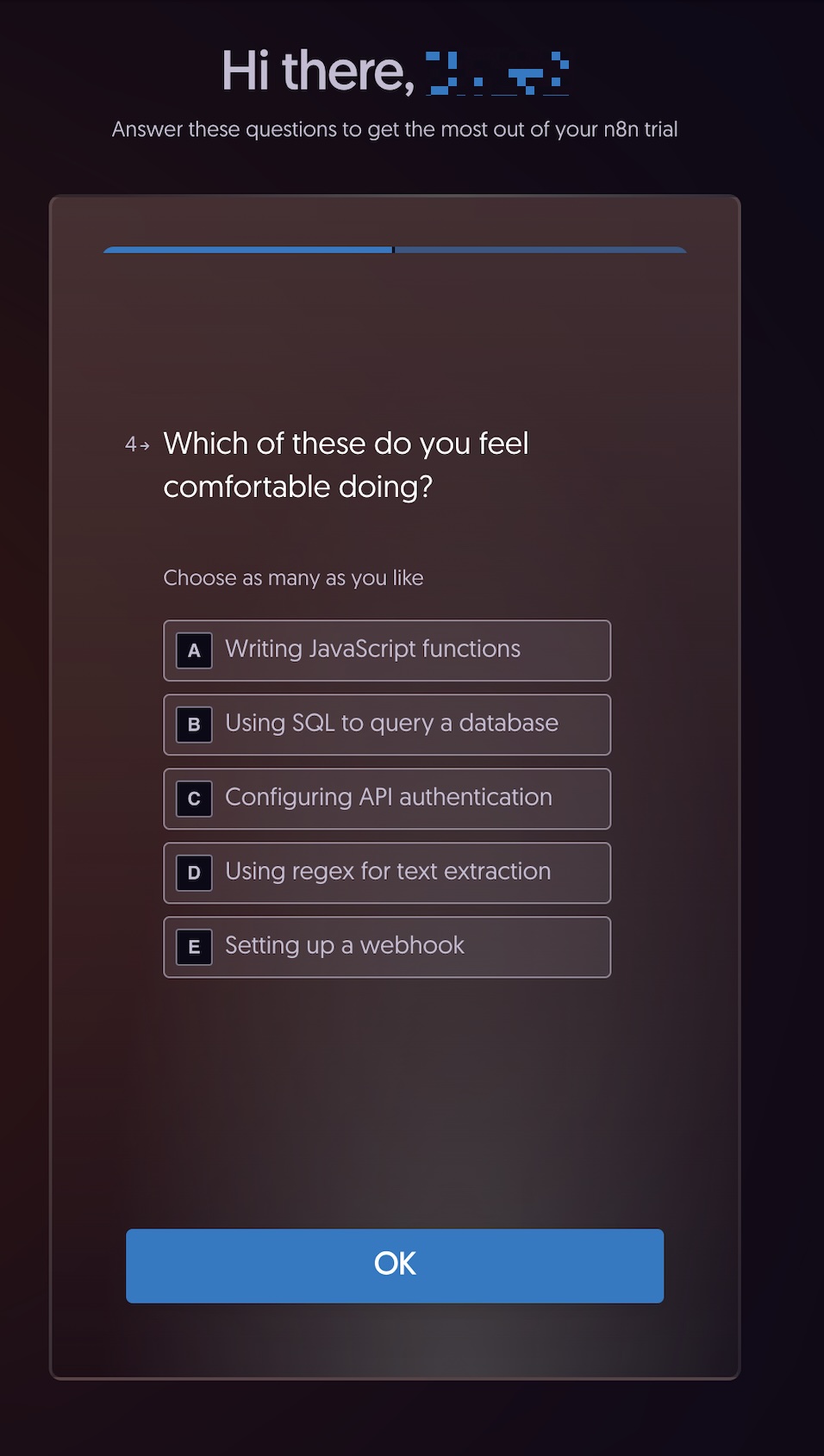
Compare that to Zapier’s onboarding, which asks you about your job role (because anyone on any team can use Zapier).
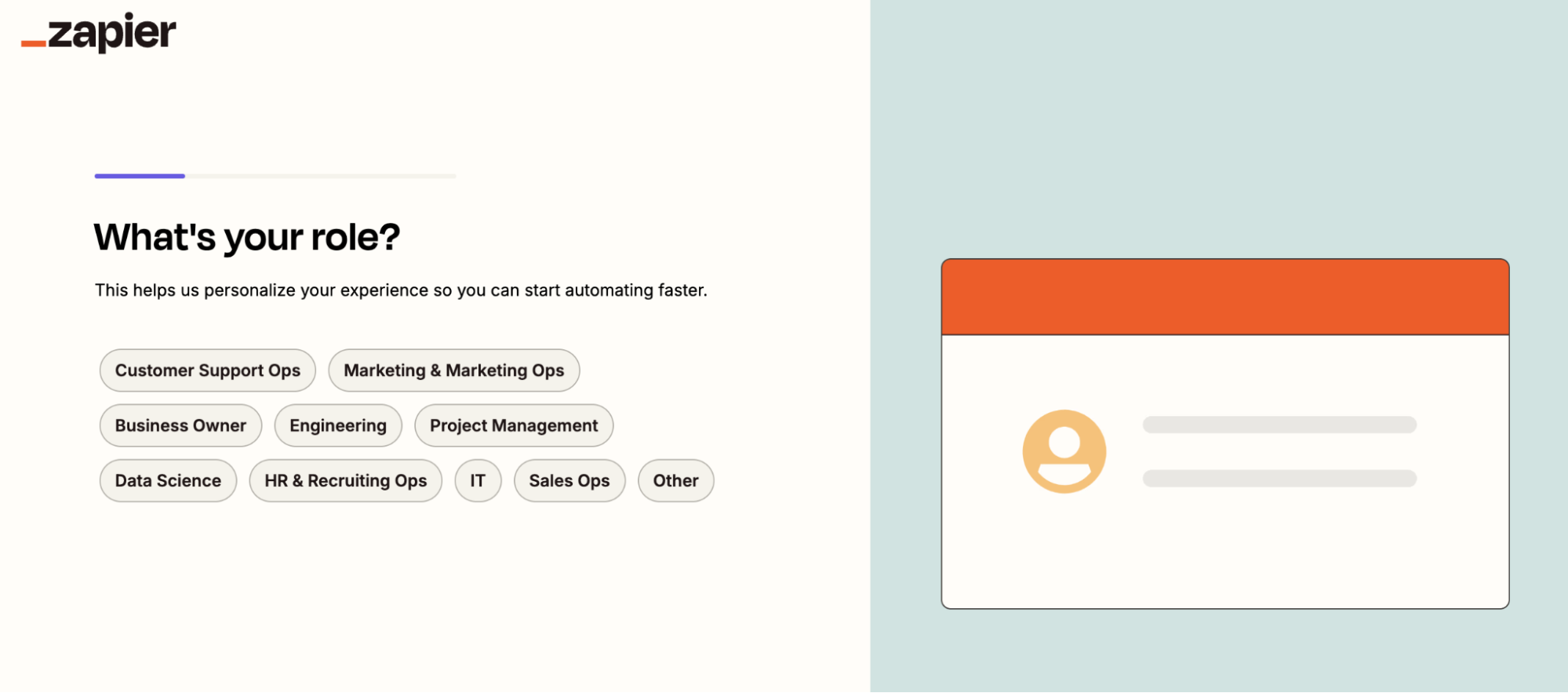
That means that, with self-hosted n8n, technical teams divide time between platform maintenance, infrastructure troubleshooting, security patching, and custom development, instead of seeing quick results from business automation and AI integration using pre-built solutions.
Zapier is built for AI orchestration
AI integration separates modern automation platforms from legacy workflow tools, and Zapier is the leader in AI orchestration. AI by Zapier lets you bring state-of-the-art AI into any app you use at work; plus, there are pre-built connectors for OpenAI’s models, Claude, Gemini, and other emerging models.
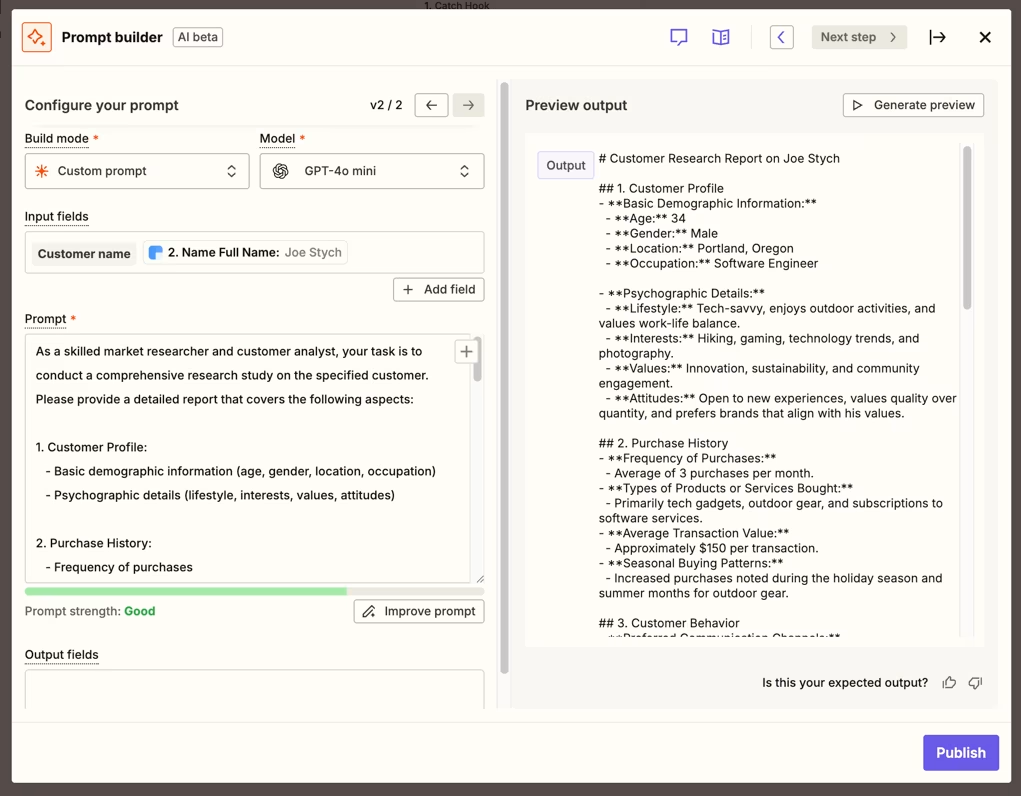
And that’s just the start. Here are some other ways you can make AI a core part of your enterprise work with Zapier:
-
AI agents can be integrated directly into workflows, so your systems can intelligently adapt—not just follow instructions. This gives you the best of both worlds: structured automation for what’s predictable, and smart AI decision-making when things aren’t.
-
Human-in-the-loop controls via Slack approvals that keep your team involved in critical decisions. Review AI-generated content, verify decisions, and maintain quality while moving at AI speed.
-
AI-first templates that speed up your time to value. Start with proven workflows based on how real companies are using AI today—for lead qualification, IT support, sales, and more.
-
Tables and Interfaces for Enterprise, giving you the building blocks to create and manage complete AI-powered systems that anyone can use—no coding required.
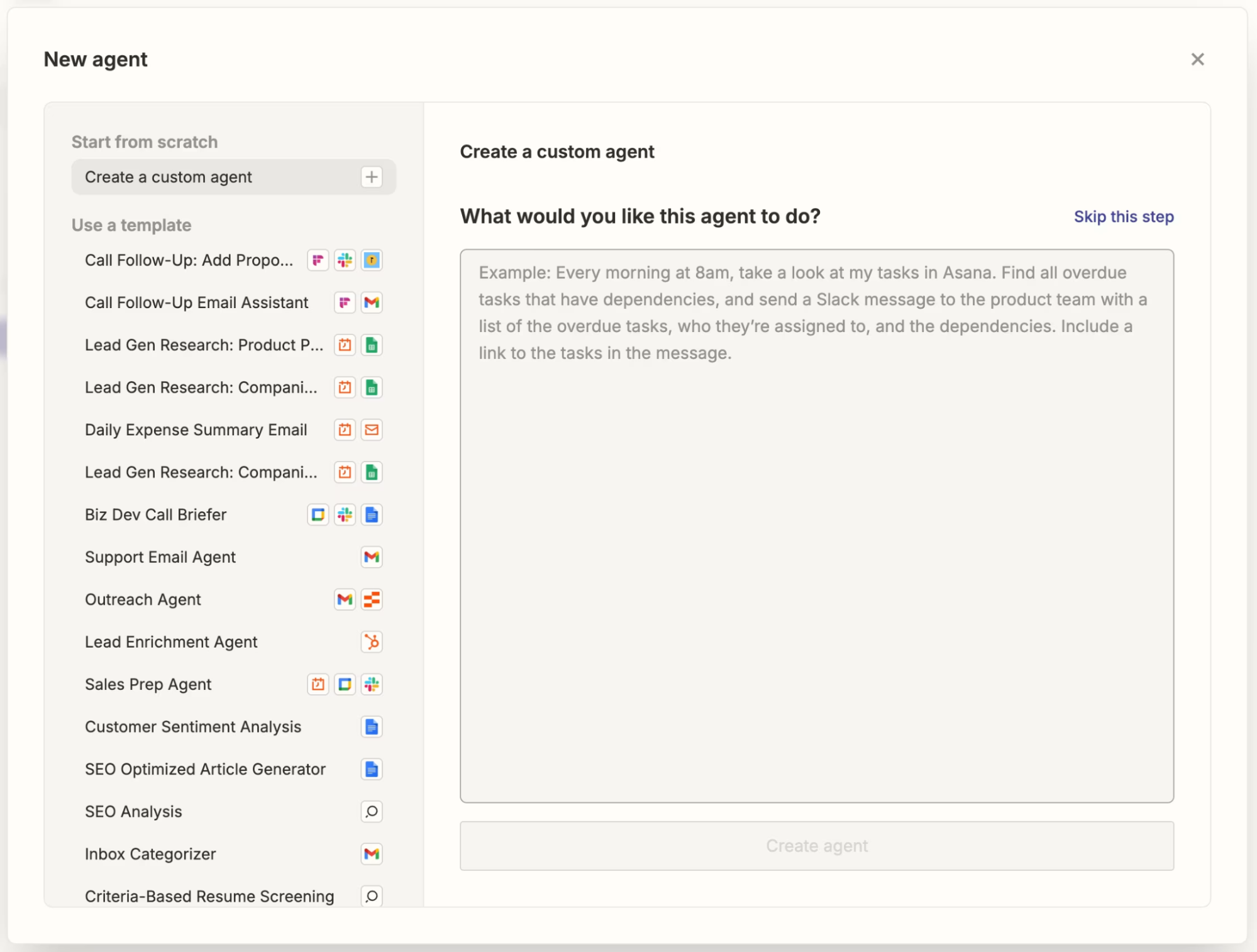
And there’s proven scale. Every day, 800,000 AI tasks are automated on Zapier.
To get AI integration on n8n, you’ll need custom development. You’re looking at manual configuration for each AI service and custom error handling and retry logic. And there’s no built-in AI governance controls and limited enterprise AI usage analytics. Simply connecting ChatGPT to Salesforce for automated lead scoring would require custom API authentication setup, manual data transformation logic, error handling implementation, and usage monitoring configuration. That’s something that Zapier could handle automatically.
Bottom line: Zapier provides all your enterprise AI requirements out-of-the-box, while n8n requires custom implementation for each.
Zapier’s integration ecosystem is pre-built; build it yourself on n8n
Integration breadth often determines automation platform success in enterprise environments. The difference between Zapier and n8n here is stark.
Zapier provides 8,000+ pre-built, enterprise-maintained integrations spanning:
-
Core business systems (e.g., Salesforce, SAP, ServiceNow)
-
Productivity platforms (Microsoft 365, Google Workspace, Slack)
-
Marketing and sales tools (e.g., HubSpot, Marketo, Pardot)
-
Finance and operations (e.g., NetSuite, Workday, Concur)
-
Emerging AI and data platforms (e.g., OpenAI, Snowflake, Databricks)
And when an app releases API updates, Zapier handles the integration changes automatically. Your workflows continue running without interruption.
n8n, on the other hand, offers approximately 400 community-maintained nodes, covering basic integrations but requiring custom development for enterprise scenarios. You’ll need to handle manual API authentication and security configuration and ongoing maintenance as third-party APIs evolve—that’s a lot of technical debt.
Even with self-hosted n8n, most enterprise use cases require external API connections. Organizations often discover they need things like complex firewall rules for each integration, extra security reviews, and other manual work that’s handled automatically by Zapier. This defeats much of the “control” benefit that initially attracted teams to self-hosting.
Zapier’s enterprise security is managed; n8n’s security is DIY
Security considerations often drive self-hosting preferences, but the reality is more nuanced.
Zapier provides enterprise-grade security as a managed service:
-
SOC 2 Type II certification: Independently audited security controls
-
GDPR compliance: Built-in data protection and privacy controls
-
Enterprise SSO: SAML 2.0 and SCIM provisioning support
-
Comprehensive audit trails: Detailed logging and access monitoring
-
Data encryption: In transit and at rest with enterprise key management
-
Compliance documentation: Zapier provides pre-built compliance materials that satisfy most enterprise audit requirements without custom implementation
With n8n, security becomes your organization’s full responsibility. The very sparse admin controls give you a sense of how little control you have over what folks do in your instance.
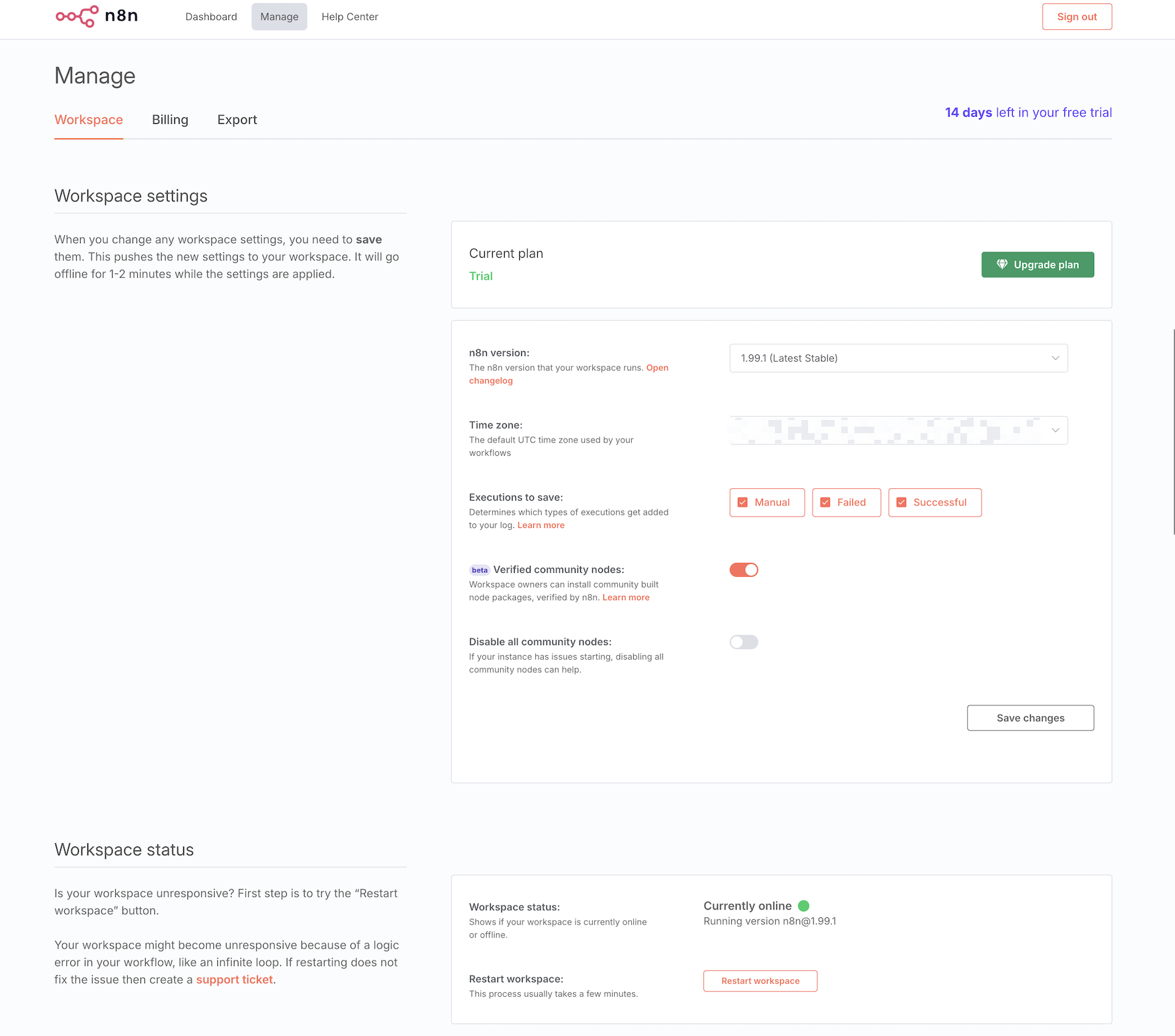
Zapier vs. n8n: Which platform is right for your enterprise?
Choosing between Zapier and n8n requires an honest assessment of your organization’s priorities and capabilities. Here are the questions I’d recommend you ask:
-
Do we want to dedicate technical resources to managing an automation platform?
-
What’s the opportunity cost of technical teams managing platforms?
-
Can we scale automation across the organization with our chosen approach?
Choose Zapier if:
-
You want to scale AI automation across your entire organization quickly
-
Your teams need to build workflows without technical expertise
-
You prefer predictable costs over hidden operational complexity
-
You want enterprise security and compliance without DIY implementation
Choose n8n if:
-
You have unlimited technical resources dedicated to automation infrastructure
-
Your organization treats automation platform management as a core competency
-
You have genuine air-gap requirements for security
-
You prefer building everything custom vs. leveraging pre-built integrations
The self-hosting conversation often comes down to control versus convenience. But in reality, it’s about resource allocation. Do you want your best technical talent maintaining automation infrastructure or building the future of your business? Zapier lets you deliver business value immediately—that’s hard to beat.